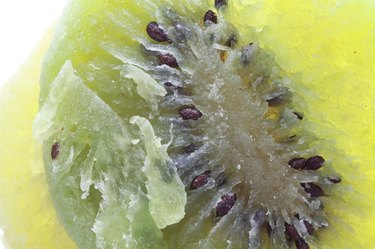
Sweet, juicy kiwi may not always be practical for long-term storage or eating on the go, so consider dried kiwi fruit as an alternative with many benefits. This dehydrated fruit is low in fat, moderately low in calories and provides healthy minerals and fiber. It is often quite high in added sugars, however, so only incorporate it into your meal plan if you eat a low-sugar diet.
Calories and Fat
Video of the Day
A 1.8-oz. serving of dried kiwi fruit contains 180 calories. This is quite a bit more than the same serving of fresh kiwi, which has 30 calories. Part of this is due to the drying process for fruit, which concentrates calories and other nutrients. As dried kiwi is usually covered in sugar, the dried fruit calories also include added sugar. Despite the increased calories, a serving of dried kiwi fruit is a good option for snacking; The Diet Channel suggests eating 100 to 200 calories for between-meal snacks. A serving of dried kiwi also includes 0.5 g of fat, a low amount that makes this dehydrated fruit a good option for low-fat diets.
Video of the Day
Carbohydrates and Fiber
Eat a serving of dried kiwi fruit, and you consume 43 g of carbohydrates. Your meal plan should have 225 to 325 g each day to boost your energy level. You also take in 0.5 g of fiber per serving of this dried fruit. Neither dried nor fresh kiwi provides a great deal of fiber – you need 25 to 38 g of fiber each day. However, a study published in the September 2007 issue of the "World Journal of Gastroenterology" indicates that Chinese men and women who ate kiwi twice each day over a four-week period experienced constipation relief thanks to the fiber content.
Minerals
Dried kiwi fruit is a good choice to boost your iron and calcium intake. One serving of this fruit provides 4 percent of the calcium you require each day. The calcium in dried kiwi bolsters bone density and strength. Evidence available in the March 2011 edition of the "Journal of Clinical Periodontology" makes the case for eating kiwi to increase antioxidant intake as a means of preventing periodontitis, an inflammatory condition of the tissues around your teeth. You also take in 3 percent of the daily recommended intake of iron, a mineral useful for increasing red blood cell production.
Sugar
Due to the typical preparation of dried kiwi fruit – the addition of granulated sugar – this fruit is high in sugar. One serving contains 23 g. Some of this sugar is natural, which does not damage your health. However, including too much added sugar in your diet can contribute to unwanted weight gain and tooth decay. Look for dried kiwi without added sugar, avoid consuming more than 25 to 37 g of sugar daily.
- Nuts Online: Dried Kiwi
- USDA National Nutrient Database: Kiwi, Raw
- The Diet Channel; Calories: What's An Ideal Daily Intake; Michele Turcotte, MS, RD/LDN
- "World Journal of Gastroenterology"; Increasing Dietary Fiber Intake in Terms of Kiwifruit Improves Constipation in Chinese Patients; A.O. Chan, et al.; September 2007
- University of Maryland Medical Center; Calcium; March 2009
- "Journal of Clinical Periodontology"; Micronutrional...; U. Van der Velden, et al.; March 2011
- University of Maryland Medical Center; Iron; June 2009
- Cleveland Clinic; Eating Too Much Sugar?; Melissa Ohlson, MS, RD, LD; December 2009